Ashwagandha tea offers a natural solution to stress relief, harnessing the power of an ancient Ayurvedic herb. This adaptogenic beverage helps lower cortisol levels, reducing anxiety and promoting relaxation. You'll find it easy to prepare at home by steeping ashwagandha root powder in hot water for 5-10 minutes. Regular consumption can improve your stress resilience, enhance cognitive function, and boost overall well-being. While supplements are available, the tea form provides a gentler, more traditional approach. With its earthy flavor and potential health benefits, ashwagandha tea might just become your go-to remedy for managing daily stress. Discover how this ancient herb can transform your modern lifestyle.
What Is Ashwagandha?
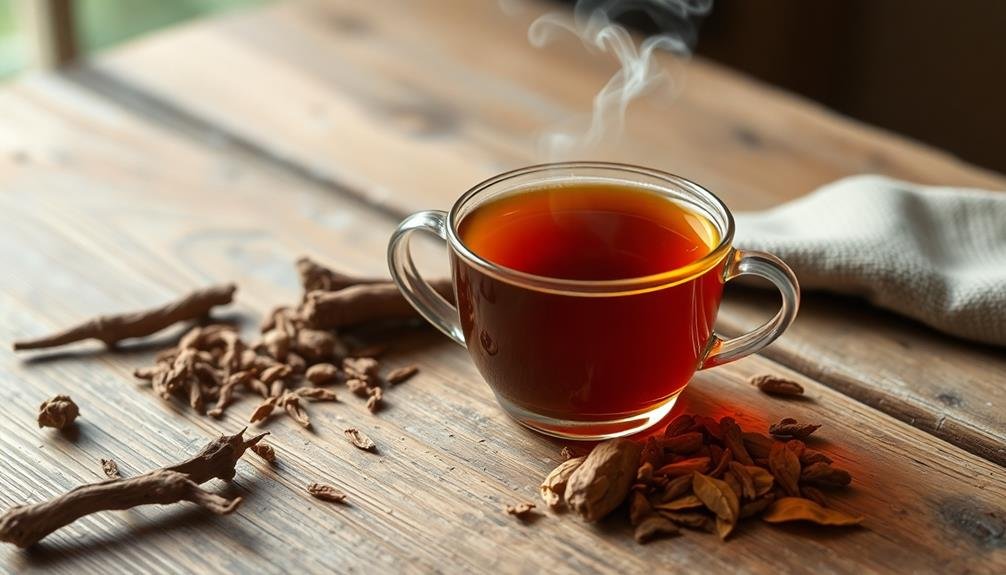
Ashwagandha, an ancient medicinal herb, has been used for thousands of years in Ayurvedic medicine. This powerful adaptogen, scientifically known as Withania somnifera, is native to India and North Africa. You might also hear it called "Indian ginseng" or "winter cherry." The name "ashwagandha" comes from Sanskrit, meaning "smell of the horse," referring to its unique odor and potential to increase strength.
The herb is derived from a small shrub with yellow flowers and red berries. Its roots and leaves are the primary parts used for medicinal purposes. Ashwagandha contains various beneficial compounds, including withanolides, which are believed to be responsible for many of its health benefits.
As an adaptogen, ashwagandha helps your body manage stress more effectively. It's known to reduce cortisol levels, the body's primary stress hormone. Additionally, it's believed to support cognitive function, boost immune system health, and even improve physical performance.
You'll find ashwagandha available in various forms, including powders, capsules, and teas. When brewed into a tea, it offers a convenient and soothing way to incorporate this stress-busting herb into your daily routine.
Historical Use of Ashwagandha
You'll find ashwagandha deeply rooted in ancient Ayurvedic medicine, where it's been used for over 3,000 years.
This powerful herb has long been a cornerstone of traditional Indian remedies, prized for its adaptogenic properties.
In Ayurveda, it's often referred to as "Indian ginseng" and has been used to promote overall wellness, enhance energy, and combat stress.
Ancient Ayurvedic Medicine
Wisdom from the ages reveals the deep-rooted significance of Ashwagandha in ancient Ayurvedic medicine. This powerful herb has been a cornerstone of holistic healing for over 3,000 years, earning its place as one of the most revered botanicals in traditional Indian healthcare.
In Ayurveda, Ashwagandha is classified as a Rasayana, a group of herbs that promote longevity and overall well-being. It's believed to balance the body's essential energies, known as doshas, particularly beneficial for Vata and Kapha types.
Ancient practitioners used Ashwagandha to address a wide range of ailments, from physical weakness to mental fatigue. You'll find references to Ashwagandha in classical Ayurvedic texts like the Charaka Samhita and Sushruta Samhita.
These ancient writings detail its use for enhancing vitality, improving memory, and combating stress-related disorders. The herb was often prescribed in combination with other botanicals or as part of complex formulations tailored to individual needs.
Ayurvedic physicians traditionally prepared Ashwagandha as a fine powder mixed with ghee, honey, or warm milk. This method of consumption was believed to enhance its potency and improve absorption, maximizing its therapeutic benefits.
Traditional Indian Remedy
Beyond its role in Ayurveda, Ashwagandha has been a staple in traditional Indian remedies for centuries. You'll find this versatile herb deeply rooted in India's cultural and medicinal practices, where it's been used to treat a wide range of ailments.
In traditional Indian medicine, Ashwagandha is known as a "rasayana," or rejuvenator. It's believed to promote longevity and overall well-being. You'd often see it prescribed for stress relief, anxiety reduction, and improved sleep quality. Indian healers have long recognized its adaptogenic properties, which help your body cope with physical and mental stress.
Ashwagandha's traditional uses extend beyond stress management. It's been employed to boost energy levels, enhance cognitive function, and support the immune system. You might be surprised to learn that it's also been used to address sexual health issues and promote fertility in both men and women.
In its various forms, including powders, tinctures, and teas, Ashwagandha has been incorporated into daily wellness routines for generations. Its enduring popularity in Indian households speaks to its perceived effectiveness and the trust placed in this ancient remedy.
Ashwagandha's Stress-Busting Properties
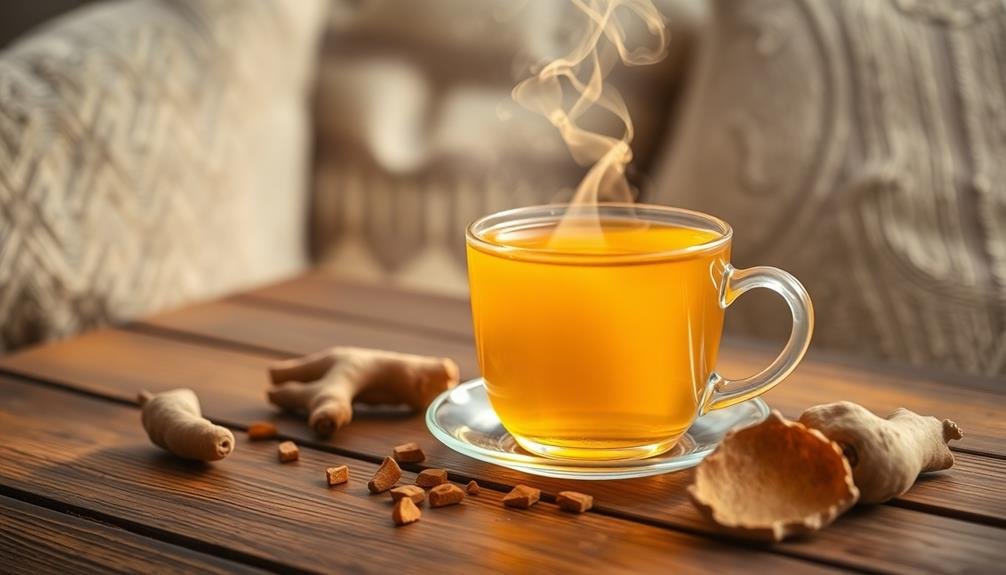
You'll find that ashwagandha's stress-busting properties are rooted in its ability to lower cortisol levels, your body's primary stress hormone.
Its anxiolytic effects can help calm your mind and reduce feelings of anxiety, contributing to an overall sense of well-being.
As an adaptogen, ashwagandha enhances your body's resilience to stress, potentially improving your ability to cope with daily challenges.
Cortisol Reduction Mechanisms
Ashwagandha's stress-busting properties stem from its ability to regulate cortisol levels in the body. Known as the "stress hormone," cortisol is produced by your adrenal glands in response to stress.
When you're chronically stressed, your cortisol levels remain elevated, leading to various health issues. Ashwagandha works by targeting the hypothalamic-pituitary-adrenal (HPA) axis, which controls your body's stress response.
The herb's active compounds, called withanolides, interact with your body's stress receptors, helping to reduce cortisol production. This cortisol-lowering effect can lead to several benefits:
- Improved mood and reduced anxiety
- Better sleep quality
- Enhanced cognitive function
- Increased resilience to stress
- Balanced energy levels throughout the day
Anxiolytic Effects Explained
The anxiolytic effects of ashwagandha tea stem from its ability to modulate neurotransmitter activity in the brain. When you consume this herbal tea, it interacts with your GABA receptors, which are responsible for calming your nervous system. This interaction enhances GABA signaling, leading to reduced anxiety and improved relaxation.
Ashwagandha also influences serotonin levels, a key neurotransmitter associated with mood regulation. By increasing serotonin activity, it helps stabilize your mood and reduce feelings of stress and anxiety.
In addition, the herb affects dopamine pathways, potentially improving your motivation and overall sense of well-being. The tea's anxiolytic properties extend to its impact on stress hormones. It helps lower cortisol levels, which can alleviate symptoms of chronic stress and anxiety.
Moreover, ashwagandha contains compounds that possess neuroprotective qualities, supporting overall brain health and resilience to stress. You'll find that regular consumption of ashwagandha tea can lead to a cumulative effect on your stress response.
Over time, it may help you develop a more balanced emotional state and improved ability to cope with daily stressors, making it an effective natural remedy for anxiety management.
Adaptogenic Stress Resilience
One of ashwagandha's most remarkable qualities is its adaptogenic nature, which enhances your body's ability to cope with stress.
As an adaptogen, ashwagandha helps your body maintain balance in the face of physical, emotional, and environmental stressors. It works by regulating your body's stress response systems, including the hypothalamic-pituitary-adrenal (HPA) axis and the sympathetic nervous system.
When you consume ashwagandha tea regularly, you'll notice improved stress resilience. This means you'll be better equipped to handle life's challenges without feeling overwhelmed.
Ashwagandha's adaptogenic properties offer several benefits:
- Reduced cortisol levels, the primary stress hormone
- Improved energy and liveliness
- Enhanced mental clarity and focus
- Better sleep quality and duration
- Increased overall sense of well-being
Making Ashwagandha Tea at Home
Brewing your own ashwagandha tea at home is a simple and cost-effective way to enjoy its stress-relieving benefits. You'll need ashwagandha root powder, which you can find at health food stores or online.
To make the tea, add 1/2 to 1 teaspoon of the powder to a cup of hot water. Stir well and let it steep for 5-10 minutes. For a smoother texture, strain the tea through a fine mesh sieve or cheesecloth.
If you find the taste too earthy, you can enhance it with honey, lemon, or cinnamon. Some people prefer to blend ashwagandha with other teas, like green tea or chamomile, for added flavor and benefits.
For a more potent brew, you can simmer the powder in water for 10-15 minutes. It's best to drink ashwagandha tea in the evening, as it can promote relaxation and improve sleep quality.
Start with one cup a day and gradually increase if needed. Remember, consistency is key to experiencing the full stress-relieving effects of ashwagandha.
Always consult with your healthcare provider before adding any new supplement to your routine, especially if you're pregnant, nursing, or taking medications.
Ideal Brewing Time and Temperature
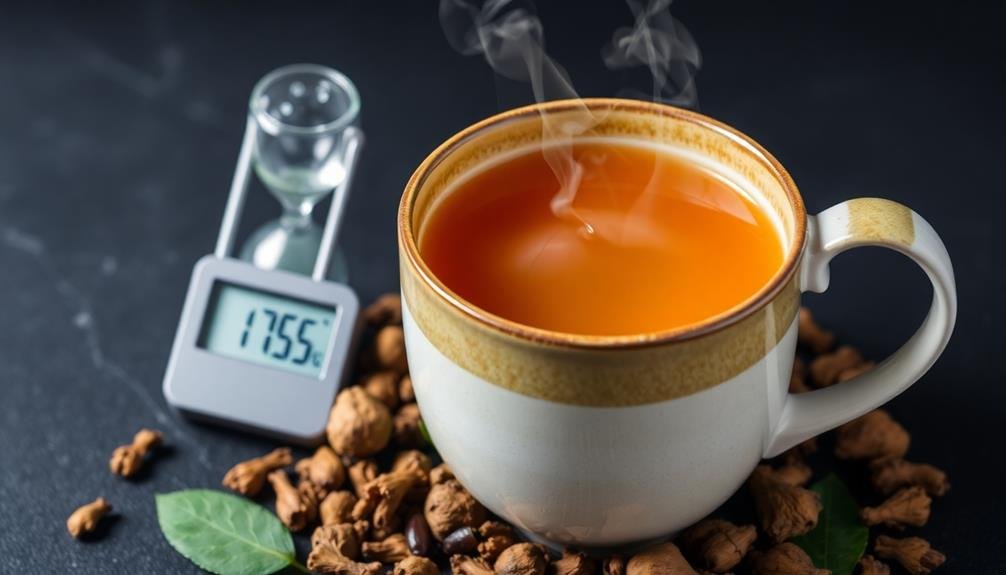
To achieve the best results from your ashwagandha tea, you'll want to pay attention to brewing time and temperature. The ideal water temperature for brewing ashwagandha tea is between 190°F and 200°F (88°C to 93°C). This range allows for the best extraction of the herb's beneficial compounds without scorching the leaves.
As for brewing time, steep your ashwagandha tea for 5 to 10 minutes. This duration guarantees that you extract the maximum amount of stress-relieving properties from the herb. Remember that steeping for too long may result in a bitter taste, while under-steeping mightn't provide the full benefits.
Here are some tips to enhance your ashwagandha tea brewing experience:
- Use a timer to guarantee consistent steeping time
- Cover your cup or teapot while brewing to retain heat and volatile compounds
- Experiment with different steeping times within the recommended range to find your preferred strength
- Use filtered water for a cleaner taste
- Add a slice of lemon or a teaspoon of honey to enhance flavor and absorption
Flavor Profile and Taste Notes
You'll find ashwagandha tea has a distinct earthy and nutty flavor profile.
It's characterized by a mild bitterness that adds depth to the overall taste experience.
This balance of flavors creates a unique and soothing beverage that many find comforting during moments of stress.
Earthy and Nutty
When it comes to flavor, ashwagandha tea offers a unique profile that's both earthy and nutty. You'll notice a robust, grounding taste that's reminiscent of the root's natural habitat. The earthy notes are complemented by a subtle nuttiness, creating a balanced and complex flavor experience.
As you sip ashwagandha tea, you might detect:
- A woody undertone reminiscent of tree bark
- A slight bitterness that's characteristic of many herbal teas
- Hints of dried mushrooms or forest floor
- A mildly sweet aftertaste
- A warming sensation that lingers on the palate
The tea's flavor can vary depending on how it's prepared and whether it's blended with other ingredients. If you're new to ashwagandha, you might find the taste somewhat challenging at first.
However, many people grow to appreciate its unique flavor profile over time. To enhance the tea's palatability, you can add a touch of honey or mix it with other complementary herbs like cinnamon or ginger.
Experimenting with different brewing methods and additions can help you find the perfect balance that suits your taste preferences while still reaping the stress-relieving benefits of this powerful adaptogenic herb.
Mild Bitterness Balance
Despite its earthy flavor profile, ashwagandha tea isn't overwhelmingly bitter. You'll notice a mild bitterness that's well-balanced with the tea's other flavor notes. This subtle bitterness actually contributes to the overall complexity of the drink, making it more interesting and satisfying.
As you sip, you'll find that the bitterness is most prominent at the back of your tongue, but it doesn't linger unpleasantly. Instead, it fades quickly, leaving a slightly sweet aftertaste. This balance between bitter and sweet notes is what makes ashwagandha tea appealing to many palates.
If you're sensitive to bitter flavors, you can easily adjust the taste. Try steeping the tea for a shorter time to reduce bitterness, or add a natural sweetener like honey or stevia.
Some people enjoy blending ashwagandha with other herbal teas to create a more complex flavor profile. Chamomile or peppermint can complement ashwagandha's earthy notes while softening any perceived bitterness.
Combining Ashwagandha With Other Herbs

Blending ashwagandha with other herbs can enhance its stress-relieving properties and create a more well-rounded tea experience. You'll find that combining this adaptogenic herb with complementary ingredients can boost its effectiveness and improve the overall flavor profile.
Consider mixing ashwagandha with calming herbs like chamomile, lavender, or lemon balm to promote relaxation and better sleep. For an energizing blend, pair it with ginseng or green tea.
Here are some popular herb combinations to try with ashwagandha:
- Tulsi (Holy Basil) for added adaptogenic benefits
- Ginger for improved digestion and anti-inflammatory effects
- Cinnamon for blood sugar regulation and a warm, spicy flavor
- Peppermint for freshness and mental clarity
- Rose petals for a floral note and mood-lifting properties
When combining herbs, start with small amounts and adjust to your taste preferences.
Remember that each herb has its own unique properties, so research potential interactions before creating your blend. Experiment with different ratios to find the perfect balance of flavors and therapeutic benefits that work best for you.
Recommended Daily Intake
Understanding the recommended daily intake of ashwagandha tea is essential for maximizing its stress-relieving benefits while avoiding potential side effects. Generally, experts suggest consuming 300-500 mg of ashwagandha root extract daily, which translates to about 1-2 cups of tea.
It's best to start with a lower dose and gradually increase it as your body adjusts. You'll want to brew your tea using 1 teaspoon of ashwagandha root powder per cup of hot water. Steep for 10-15 minutes before straining. For ideal results, drink your ashwagandha tea twice daily, once in the morning and once in the evening.
Remember that consistency is key – you'll need to maintain this routine for several weeks to experience the full stress-relieving effects.
It's important to note that while ashwagandha is generally safe for most people, it's not recommended for pregnant or breastfeeding women, those with autoimmune diseases, or individuals taking certain medications.
Always consult with your healthcare provider before adding ashwagandha tea to your daily routine, especially if you have any pre-existing health conditions or are taking other supplements or medications.
Potential Side Effects
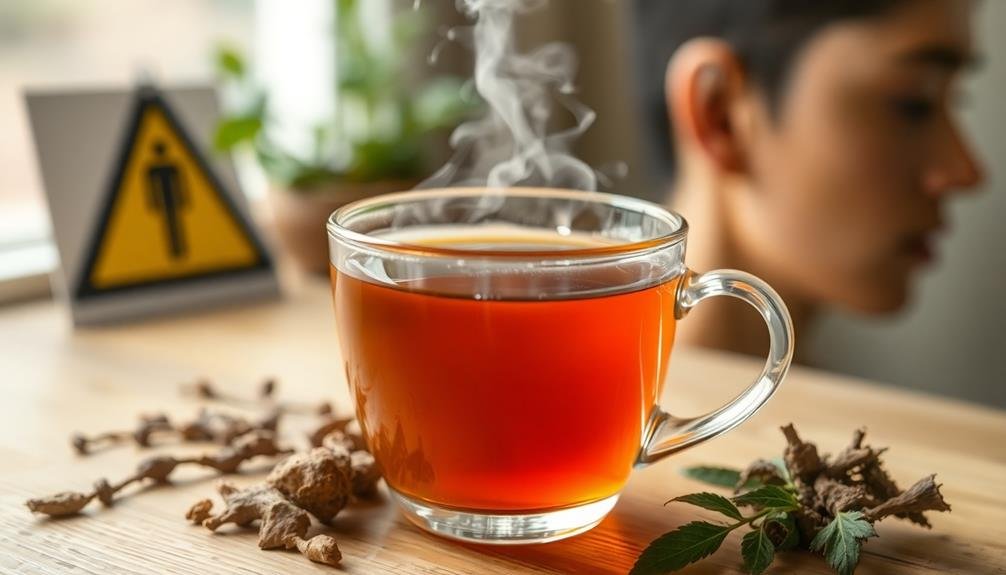
While ashwagandha tea offers numerous benefits, it's important to be aware of its potential side effects. Although generally considered safe for most people, some individuals may experience adverse reactions. If you're pregnant, breastfeeding, or have certain medical conditions, it's essential to consult your healthcare provider before incorporating ashwagandha tea into your routine.
Common side effects you might experience include:
- Digestive issues like upset stomach, diarrhea, or nausea
- Headaches or dizziness
- Drowsiness or excessive sleepiness
- Mild skin irritation or rashes
- Changes in blood pressure or blood sugar levels
If you're taking medications, particularly for thyroid disorders, diabetes, or autoimmune conditions, be cautious as ashwagandha may interact with them.
It's also worth noting that ashwagandha can potentially increase testosterone levels, which may not be suitable for everyone. Additionally, some people may experience allergic reactions to ashwagandha, especially if they're sensitive to plants in the nightshade family.
If you notice any severe or persistent side effects, discontinue use immediately and seek medical attention. Always start with a low dose and gradually increase it to assess your body's response to ashwagandha tea.
Ashwagandha Tea vs. Supplements
When choosing between ashwagandha tea and supplements, you'll find key differences in their preparation, absorption, and overall experience.
Ashwagandha tea offers a more traditional and holistic approach. You'll steep the root or powder in hot water, creating a warm, comforting beverage. This method allows for gradual absorption and can be easily incorporated into your daily routine.
Supplements, on the other hand, come in various forms like capsules, tablets, or tinctures. They provide a more concentrated dose of ashwagandha's active compounds and offer precise measurements. You'll find them convenient for on-the-go use and consistent dosing.
Tea may have a milder effect due to its lower concentration, but it's gentler on your digestive system. Supplements can deliver a stronger impact but might cause stomach discomfort in some people.
The tea's taste can be an acquired one, while supplements bypass this issue entirely.
Consider your lifestyle and preferences when deciding. If you enjoy rituals and natural remedies, tea might be your go-to. For those seeking efficiency and potency, supplements could be the better choice.
Ultimately, both forms can provide stress relief benefits, so choose what aligns best with your needs and habits.
Scientific Studies on Ashwagandha

Research on ashwagandha's stress-relieving properties has gained momentum in recent years. Numerous studies have explored its potential benefits, focusing on its adaptogenic qualities and impact on stress hormones. You'll find that scientific evidence supports ashwagandha's ability to reduce cortisol levels, improve sleep quality, and enhance overall well-being.
Clinical trials have shown promising results in various areas:
- Stress reduction and anxiety management
- Improved cognitive function and memory
- Enhanced physical performance and endurance
- Lowered inflammation markers
- Better sleep quality and duration
These studies often use standardized ashwagandha extracts, but the herb's effects can also be obtained through tea consumption.
While more research is needed to fully understand the best dosage and long-term effects, existing studies provide a solid foundation for ashwagandha's stress-relieving potential.
As you explore the scientific literature, you'll notice that many studies highlight ashwagandha's safety profile and minimal side effects. This makes it an attractive option for those seeking natural stress relief.
However, it's crucial to consult with a healthcare professional before incorporating ashwagandha into your routine, especially if you have pre-existing health conditions or are taking medications.
Purchasing Quality Ashwagandha
To guarantee you're getting the full benefits of ashwagandha tea, purchasing high-quality products is essential. Look for organic, non-GMO ashwagandha root powder or tea bags from reputable brands. Check the product label for the percentage of withanolides, the active compounds in ashwagandha. A higher percentage typically indicates better quality.
When buying ashwagandha, consider these factors:
| Factor | What to Look For | Why It Matters |
|---|---|---|
| Source | Organic, wildcrafted | Fewer pesticides |
| Form | Root powder, tea bags | Ease of use |
| Withanolides | 2.5% or higher | Potency indicator |
| Brand reputation | Positive reviews, certifications | Quality assurance |
| Price | Mid-range | Balance of quality and value |
Don't be swayed by the cheapest options, as they may contain fillers or lower-quality ingredients. However, the most expensive product isn't always the best. Research brands, read customer reviews, and consult with a healthcare professional if you're unsure. Remember, ashwagandha tea's effectiveness depends on consistent use, so choose a product you'll enjoy consuming regularly.
Storing Ashwagandha Tea
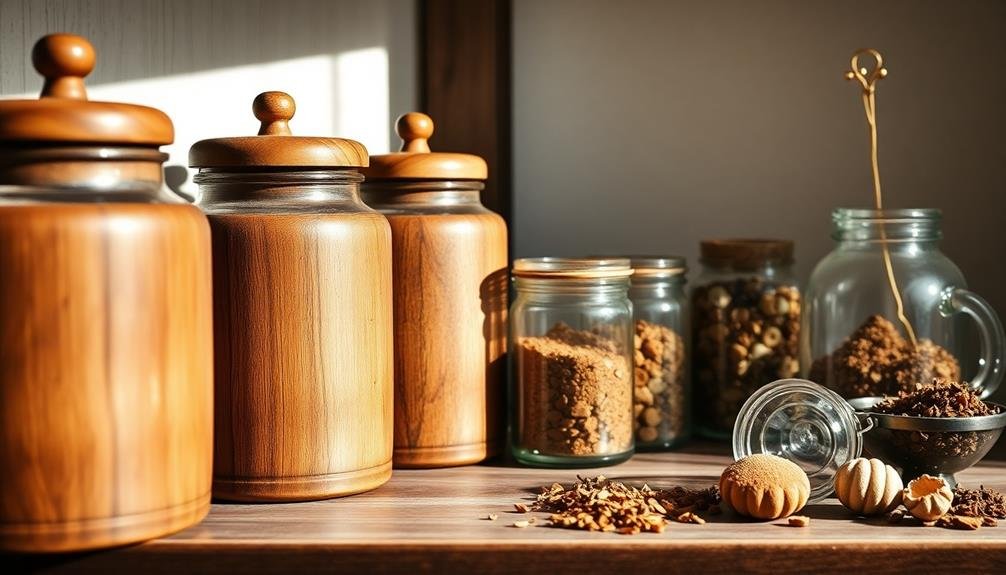
Proper storage of ashwagandha tea is essential for maintaining its potency and freshness. Once you've purchased your high-quality ashwagandha tea, you'll want to guarantee it stays in prime condition.
Store your tea in an airtight container to prevent moisture and odors from affecting its flavor and effectiveness. Keep it in a cool, dark place away from direct sunlight, as heat and light can degrade the active compounds.
You'll get the most out of your ashwagandha tea by following these storage tips:
- Use an opaque, airtight container to protect the tea from light and air
- Store in a cool, dry place like a pantry or cupboard
- Avoid storing near strong-smelling foods or spices
- Keep away from heat sources like stoves or radiators
- Check for freshness regularly and discard if it smells musty or stale
It's best to consume your ashwagandha tea within six months to a year of purchase for peak benefits.
If you've bought loose tea, consider portioning it into smaller containers to minimize air exposure each time you brew a cup.
Frequently Asked Questions
Can Pregnant or Breastfeeding Women Safely Consume Ashwagandha Tea?
You shouldn't consume ashwagandha tea if you're pregnant or breastfeeding. It's not considered safe for these conditions and may cause complications. Always consult your healthcare provider before using any herbal products during pregnancy or while nursing.
How Long Does It Take to Feel the Effects of Ashwagandha Tea?
You'll typically feel ashwagandha tea's effects within 2-4 weeks of regular consumption. However, some people notice subtle changes in a few days. It's important to be consistent and patient as results can vary for everyone.
Is Ashwagandha Tea Safe for Children to Drink?
You shouldn't give ashwagandha tea to children without consulting a pediatrician first. It's generally not recommended for kids due to limited research on its effects in young bodies. Stick to child-safe herbal teas instead for your little ones.
Can Ashwagandha Tea Interact With Prescription Medications?
Yes, ashwagandha tea can interact with various medications. You should consult your doctor before drinking it if you're taking prescription drugs. It may affect blood sugar, thyroid hormones, and blood pressure medications, among others.
Is It Possible to Develop a Tolerance to Ashwagandha's Benefits Over Time?
While it's possible you might develop some tolerance to ashwagandha's benefits over time, it's not common. You can maintain its effectiveness by taking occasional breaks or cycling your dosage. Always consult your doctor for personalized advice.
In Summary
You've now discovered the power of ashwagandha tea for stress relief. It's an ancient remedy with modern scientific backing. Whether you brew it at home or opt for supplements, ashwagandha can be a valuable addition to your wellness routine. Remember to choose high-quality sources and store your tea properly. As with any new supplement, it's wise to consult your healthcare provider before incorporating ashwagandha into your daily regimen. Give it a try and see how it works for you!





Leave a Reply